Watched June 25 - July 1, 2007: Imai, Ichikawa, To
Mata au hi made / Till We Meet Again (Tadashi Imai, 1950)
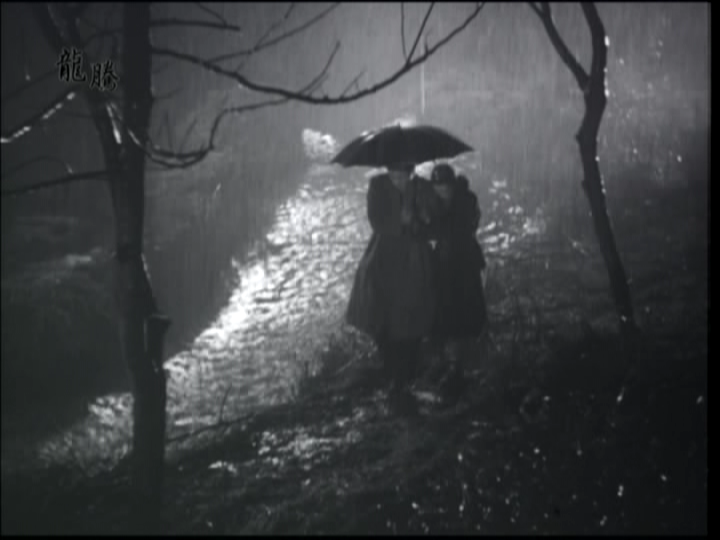 An early post-war film looking at the shattering of ordinary people's lives as a result of the war. This focuses narrowly on the relationship between a rich college boy (Eiji Okada) and a working class girl (a darling young Yoshiko Kuga) -- she works for a living, but is also a would-be painter. They first meet when thrown together during an early (pre-firebombing) air raid on Tokyo -- in a bomb shelter.
An early post-war film looking at the shattering of ordinary people's lives as a result of the war. This focuses narrowly on the relationship between a rich college boy (Eiji Okada) and a working class girl (a darling young Yoshiko Kuga) -- she works for a living, but is also a would-be painter. They first meet when thrown together during an early (pre-firebombing) air raid on Tokyo -- in a bomb shelter. 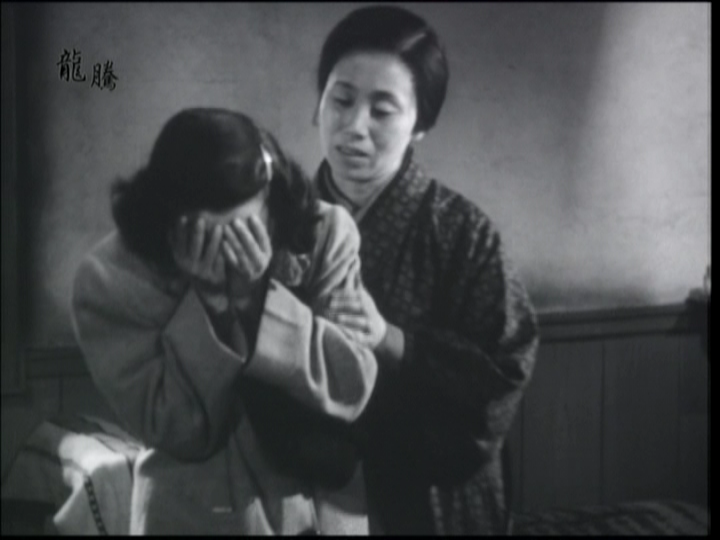 They meet again (at first by accident) -- and grow fond of each other. Neither is brave enough to tell their family of their romance with a member of a different class. He is finally drafted -- and they are supposed to meet one more time, prior to his departure. Because of the sudden illness of his older sister, Okada is late for their rendezvous -- and while she waits in increasing agitation, another air raid occurs...
They meet again (at first by accident) -- and grow fond of each other. Neither is brave enough to tell their family of their romance with a member of a different class. He is finally drafted -- and they are supposed to meet one more time, prior to his departure. Because of the sudden illness of his older sister, Okada is late for their rendezvous -- and while she waits in increasing agitation, another air raid occurs...
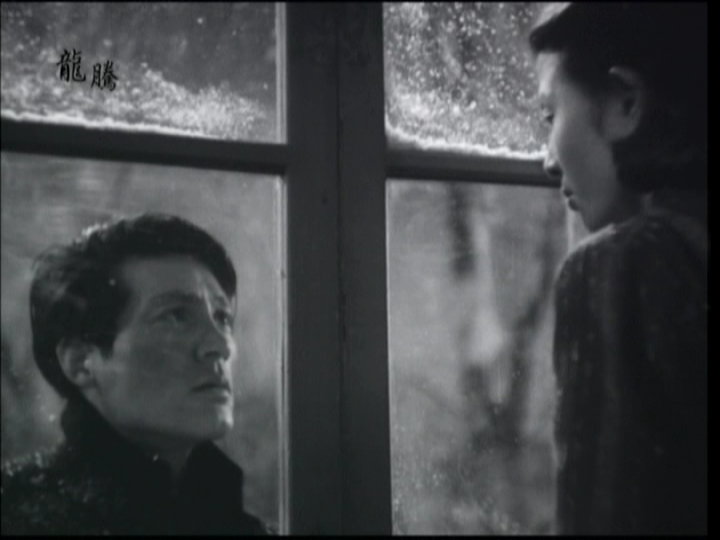 Beautifully shot (with a kissing-through-a-window shot that is heart melting) with wonderful performances by the leads (and by Haruko Sugimura, playing Kuga's mother). The only negative some very obtrusive (usually not especially necessary) voiceovers. And the Taiwanese DVD I saw had an annoying logo burned into the upper left corner. Too bad a good edition, with English subtitles, is not available.
Beautifully shot (with a kissing-through-a-window shot that is heart melting) with wonderful performances by the leads (and by Haruko Sugimura, playing Kuga's mother). The only negative some very obtrusive (usually not especially necessary) voiceovers. And the Taiwanese DVD I saw had an annoying logo burned into the upper left corner. Too bad a good edition, with English subtitles, is not available.
http://i9.photobucket.com/albums/a59/mkerpan/imai/meet/mata02.png
http://i9.photobucket.com/albums/a59/mkerpan/imai/meet/mata04.png
http://i9.photobucket.com/albums/a59/mkerpan/imai/meet/mata05.png
http://i9.photobucket.com/albums/a59/mkerpan/imai/meet/mata06.png
http://i9.photobucket.com/albums/a59/mkerpan/imai/meet/mata09.png
http://i9.photobucket.com/albums/a59/mkerpan/imai/meet/mata10.png
http://i9.photobucket.com/albums/a59/mkerpan/imai/meet/mata13.png
http://i9.photobucket.com/albums/a59/mkerpan/imai/meet/mata16.png
http://i9.photobucket.com/albums/a59/mkerpan/imai/meet/mata17.png
Kome / Rice (Tadashi Imai, 1957)
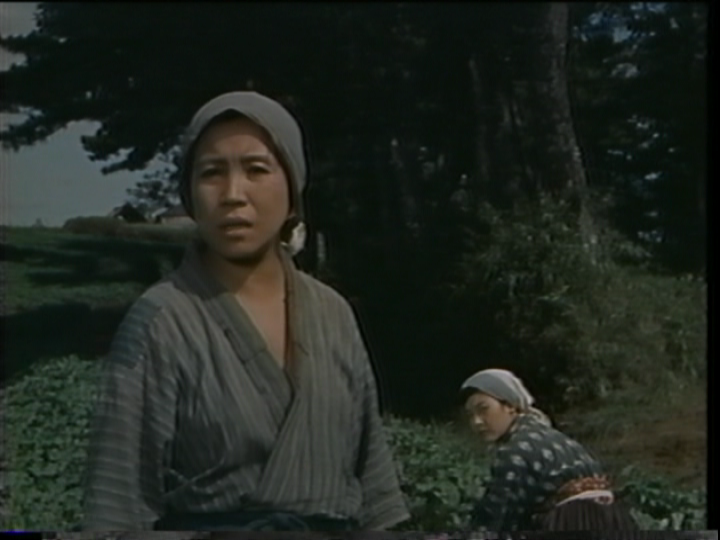 This film was set in a coastal village northeast of Tokyo, seemingly with a contemporary setting -- though life here seems still pretty old-fashioned. Most residents do the back-breaking work of rice farming, a few young people have taken up fishing. The film starts with a rather wide focus, but slowly tightens its field to (mostly) one family headed by Yoko Mochizuki (her husband appears disabled in some fashion). T
This film was set in a coastal village northeast of Tokyo, seemingly with a contemporary setting -- though life here seems still pretty old-fashioned. Most residents do the back-breaking work of rice farming, a few young people have taken up fishing. The film starts with a rather wide focus, but slowly tightens its field to (mostly) one family headed by Yoko Mochizuki (her husband appears disabled in some fashion). T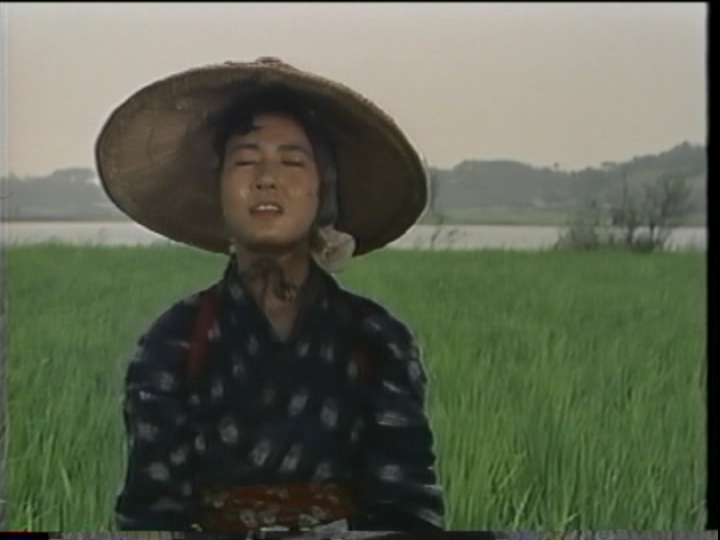 o help make ends meet, Mochizuki and her daughter go out out at night to fish for eels (apparently illlegally). Things don't go especially well for the family. Imai is often faulted for his overt leftism. This film (written by the same man who wrote the script for Uchida's 1930s silent on rice farming, "Earth") didn't strike me as particularly ideological -- unless it is "ideological" to present working class people in a sympathetic (yet realistic) fashion and to portray the hardships they face in life.
o help make ends meet, Mochizuki and her daughter go out out at night to fish for eels (apparently illlegally). Things don't go especially well for the family. Imai is often faulted for his overt leftism. This film (written by the same man who wrote the script for Uchida's 1930s silent on rice farming, "Earth") didn't strike me as particularly ideological -- unless it is "ideological" to present working class people in a sympathetic (yet realistic) fashion and to portray the hardships they face in life.
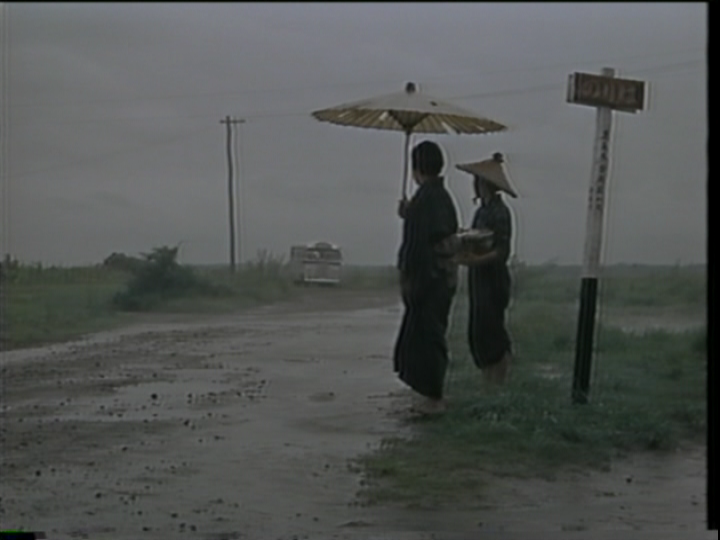
Even with a so-so (off the TV) source, this is a pretty gorgeous looking color film. Because of the large cast, it is hard to focus on the performances of many of the individuals involved -- but Mochizuki does offer an affecting performance.
http://i9.photobucket.com/albums/a59/mkerpan/imai/kome/rice02.png
http://i9.photobucket.com/albums/a59/mkerpan/imai/kome/rice03.png
http://i9.photobucket.com/albums/a59/mkerpan/imai/kome/rice04.png
http://i9.photobucket.com/albums/a59/mkerpan/imai/kome/rice06.png
http://i9.photobucket.com/albums/a59/mkerpan/imai/kome/rice07.png
http://i9.photobucket.com/albums/a59/mkerpan/imai/kome/rice11.png
http://i9.photobucket.com/albums/a59/mkerpan/imai/kome/rice12.png
http://i9.photobucket.com/albums/a59/mkerpan/imai/kome/rice15.png
http://i9.photobucket.com/albums/a59/mkerpan/imai/kome/rice16.png
http://i9.photobucket.com/albums/a59/mkerpan/imai/kome/rice18.png
http://i9.photobucket.com/albums/a59/mkerpan/imai/kome/rice19.png
http://i9.photobucket.com/albums/a59/mkerpan/imai/kome/rice20.png
http://i9.photobucket.com/albums/a59/mkerpan/imai/kome/rice21.png
Manin densha / The Crowded Street Car / The Full-Up Train (Kon Ichikawa, 1957)
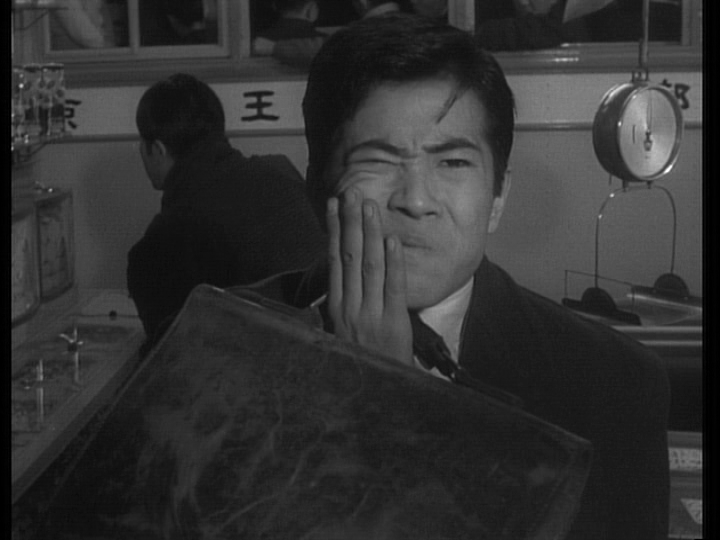 This starts in a straightforward enough manner -- a young man (Hiroshi Kawaguchi -- later in "Giants and Toys" and "Floating Weeds") graduates from college (during an outside ceremony, held during a rainstorm) and goes off to his first real job -- at the Camel Brewery. Unfortunately, his girlfriend (Michiko Ono) has taken a teaching job in another town -- but both go off filled with optimism. After a dull training program, our young hero starts work in the order processing department with great energy, only to be warned by a senior colleague that it is not wise to finish off a day's work during the first hour so of the morning.
This starts in a straightforward enough manner -- a young man (Hiroshi Kawaguchi -- later in "Giants and Toys" and "Floating Weeds") graduates from college (during an outside ceremony, held during a rainstorm) and goes off to his first real job -- at the Camel Brewery. Unfortunately, his girlfriend (Michiko Ono) has taken a teaching job in another town -- but both go off filled with optimism. After a dull training program, our young hero starts work in the order processing department with great energy, only to be warned by a senior colleague that it is not wise to finish off a day's work during the first hour so of the morning. 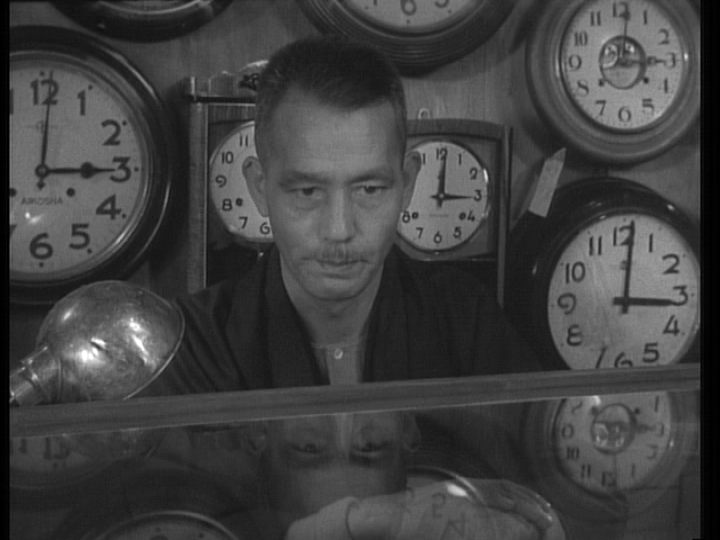 Then, gradually, things start going wrong. His girlfriend loses her job -- and wants to get married. But our hero, lives in a tiny corporate dorm room, where women are not allowed -- so she departs disconsolately. Then our hero learns that his father (Chishu Ryu -- who runs a clock shop here) and mother (Haruko Sugimura) are each trying to get the other committed to a mental institution -- on allegations of insanity. And then the plots spins into surrealism (or absurdism or utter wildness)...
Then, gradually, things start going wrong. His girlfriend loses her job -- and wants to get married. But our hero, lives in a tiny corporate dorm room, where women are not allowed -- so she departs disconsolately. Then our hero learns that his father (Chishu Ryu -- who runs a clock shop here) and mother (Haruko Sugimura) are each trying to get the other committed to a mental institution -- on allegations of insanity. And then the plots spins into surrealism (or absurdism or utter wildness)...
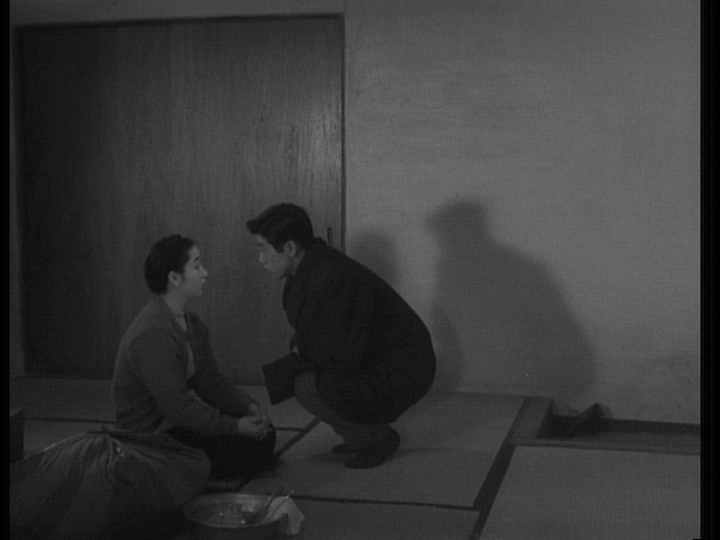
Because this is a Kon Ichikawa film, one might assume this is impressive looking -- and it is. It's hard to judge the writing on a single viewing (given the lack of subtitles -- and the of any detailed synopsis). Overall quite fascinating -- I wonder if subtitles would make it easier to follow -- or just case additional mystification.
http://i9.photobucket.com/albums/a59/mkerpan/ichikawa_kon/train/manin01.png
http://i9.photobucket.com/albums/a59/mkerpan/ichikawa_kon/train/manin03.png
http://i9.photobucket.com/albums/a59/mkerpan/ichikawa_kon/train/manin04.png
http://i9.photobucket.com/albums/a59/mkerpan/ichikawa_kon/train/manin05.png
http://i9.photobucket.com/albums/a59/mkerpan/ichikawa_kon/train/manin06.png
http://i9.photobucket.com/albums/a59/mkerpan/ichikawa_kon/train/manin08.png
http://i9.photobucket.com/albums/a59/mkerpan/ichikawa_kon/train/manin09.png
http://i9.photobucket.com/albums/a59/mkerpan/ichikawa_kon/train/manin10.png
http://i9.photobucket.com/albums/a59/mkerpan/ichikawa_kon/train/manin11.png
http://i9.photobucket.com/albums/a59/mkerpan/ichikawa_kon/train/manin12.png
http://i9.photobucket.com/albums/a59/mkerpan/ichikawa_kon/train/manin13.png
http://i9.photobucket.com/albums/a59/mkerpan/ichikawa_kon/train/manin14.png
http://i9.photobucket.com/albums/a59/mkerpan/ichikawa_kon/train/manin15.png
http://i9.photobucket.com/albums/a59/mkerpan/ichikawa_kon/train/manin17.png
http://i9.photobucket.com/albums/a59/mkerpan/ichikawa_kon/train/manin18.png
http://i9.photobucket.com/albums/a59/mkerpan/ichikawa_kon/train/manin19.png
http://i9.photobucket.com/albums/a59/mkerpan/ichikawa_kon/train/manin20.png
http://i9.photobucket.com/albums/a59/mkerpan/ichikawa_kon/train/manin21.png
http://i9.photobucket.com/albums/a59/mkerpan/ichikawa_kon/train/manin22.png
Dung fong saam hap / Heroic Trio (Johnnie To, 1993)
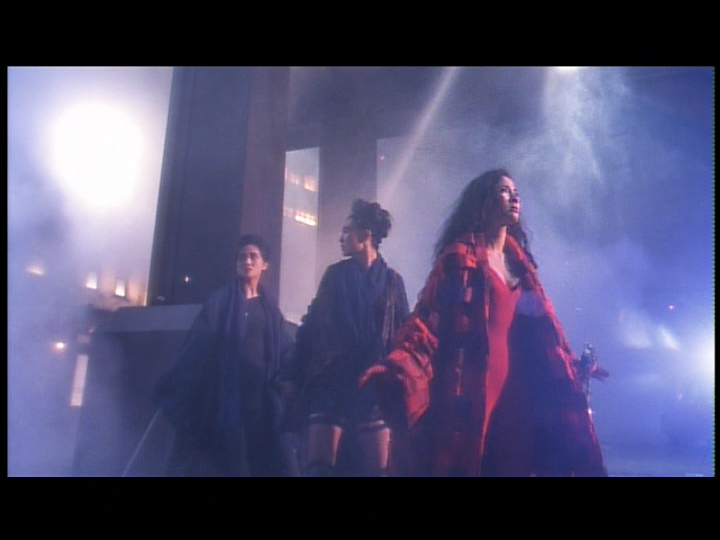 More like a comic book than serious literature, To's film offers an unsettling blend of tragedy and comedy (sometimes mere seconds apart). At its core, pretty grim and violent -- the plot involves a madman looking for a new emperor, who is having infant boys stolen from hospitals. Michelle Yeoh is apparently carrying out the thefts because she is a disciple of the mad master (
More like a comic book than serious literature, To's film offers an unsettling blend of tragedy and comedy (sometimes mere seconds apart). At its core, pretty grim and violent -- the plot involves a madman looking for a new emperor, who is having infant boys stolen from hospitals. Michelle Yeoh is apparently carrying out the thefts because she is a disciple of the mad master (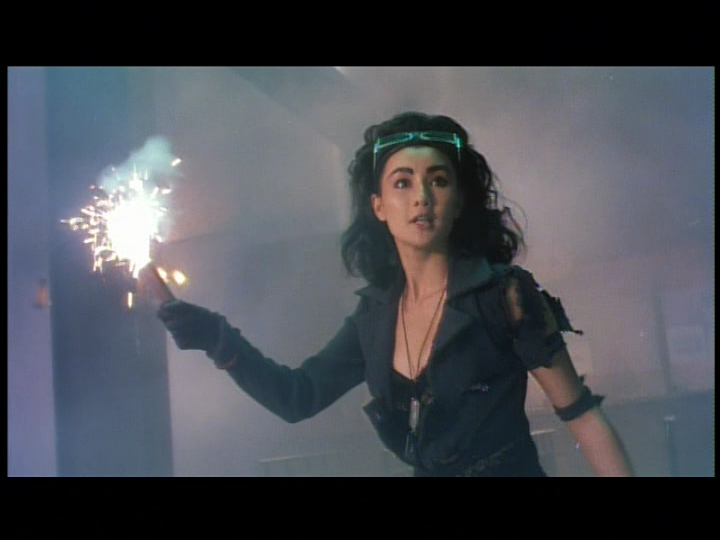 and her scientist husband has been working on an invisibility device). Anita Mui is the wife of a police official -- and a masked crusader for justice for the helpless in her spare time (unknown to her husband). Maggie Cheung is a motorcycle-riding mercenary -- who will work (she says) for whoever pays best (whther police or criminals). Anthony Wong is a not-too-bright, but seemingly unbeatable killing machine under the command of the master.
and her scientist husband has been working on an invisibility device). Anita Mui is the wife of a police official -- and a masked crusader for justice for the helpless in her spare time (unknown to her husband). Maggie Cheung is a motorcycle-riding mercenary -- who will work (she says) for whoever pays best (whther police or criminals). Anthony Wong is a not-too-bright, but seemingly unbeatable killing machine under the command of the master.
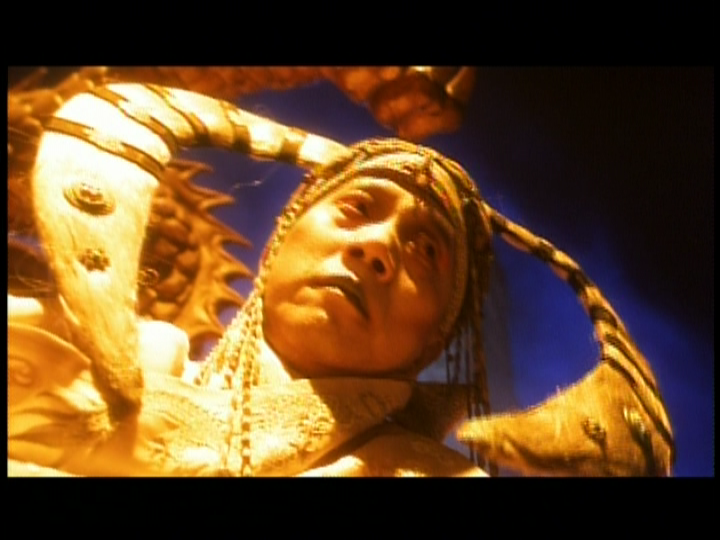
Recounting the plot is pretty pointless -- because it often makes only minimal sense. But our heroines are hot -- and so is the action -- and that's probably about all the point there is (or needs to be) to this.
http://i9.photobucket.com/albums/a59/mkerpan/to/trio/heroic01.png
http://i9.photobucket.com/albums/a59/mkerpan/to/trio/heroic02.png
http://i9.photobucket.com/albums/a59/mkerpan/to/trio/heroic03.png
http://i9.photobucket.com/albums/a59/mkerpan/to/trio/heroic07.png
http://i9.photobucket.com/albums/a59/mkerpan/to/trio/heroic08.png
http://i9.photobucket.com/albums/a59/mkerpan/to/trio/heroic09.png
http://i9.photobucket.com/albums/a59/mkerpan/to/trio/heroic10.png
http://i9.photobucket.com/albums/a59/mkerpan/to/trio/heroic13.png
http://i9.photobucket.com/albums/a59/mkerpan/to/trio/heroic17.png
http://i9.photobucket.com/albums/a59/mkerpan/to/trio/heroic18.png
Sau san naam neui / Love on a Diet (Johnnie To and WAI Ka-fai, 2001)
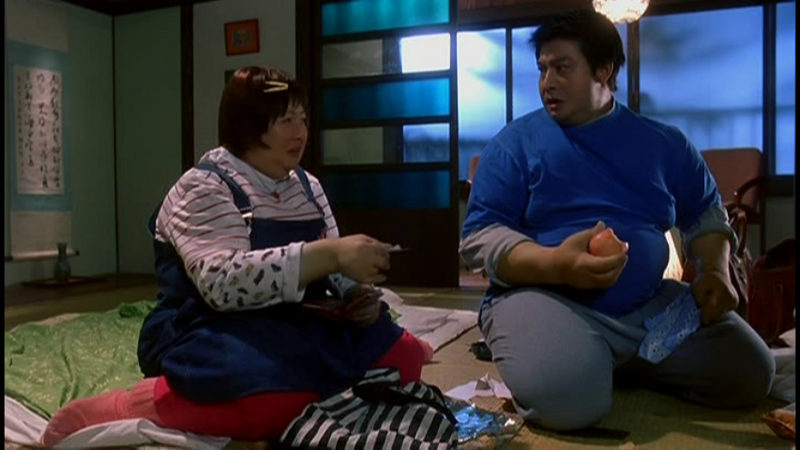 Your only chance to see the hunky Andy Lau and willowy Sammi Cheng in fat suits, looking like they weigh somewhere in the 300 pound range -- and speaking lots of fractured Japanese. Despite all, they actually manage to act quite nicely (and funnily).
Your only chance to see the hunky Andy Lau and willowy Sammi Cheng in fat suits, looking like they weigh somewhere in the 300 pound range -- and speaking lots of fractured Japanese. Despite all, they actually manage to act quite nicely (and funnily).
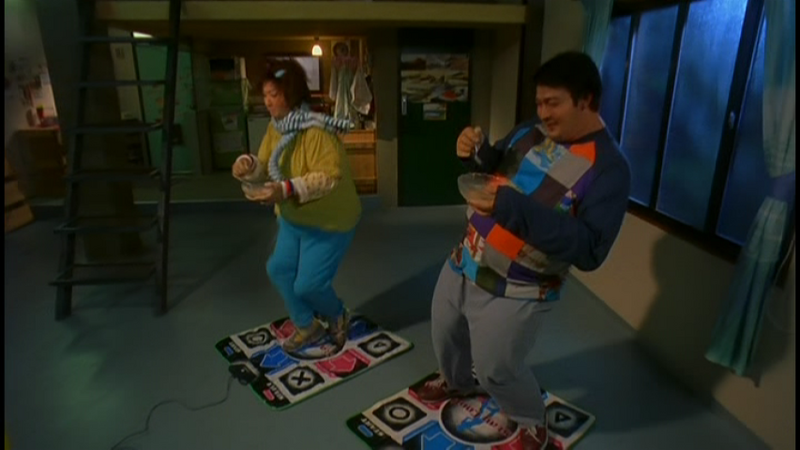 Cheng came to Japan (from Hong Kong) 10 years prior to the opening of the film to study singing and fell in love wwith a Japanese pianist. He loved her, but won a scholarship that took him to the UNited States -- and Cheng couldn't follow him. Pining in his absence, she ate and ate to console herself -- and ballooned in size.
Cheng came to Japan (from Hong Kong) 10 years prior to the opening of the film to study singing and fell in love wwith a Japanese pianist. He loved her, but won a scholarship that took him to the UNited States -- and Cheng couldn't follow him. Pining in his absence, she ate and ate to console herself -- and ballooned in size. 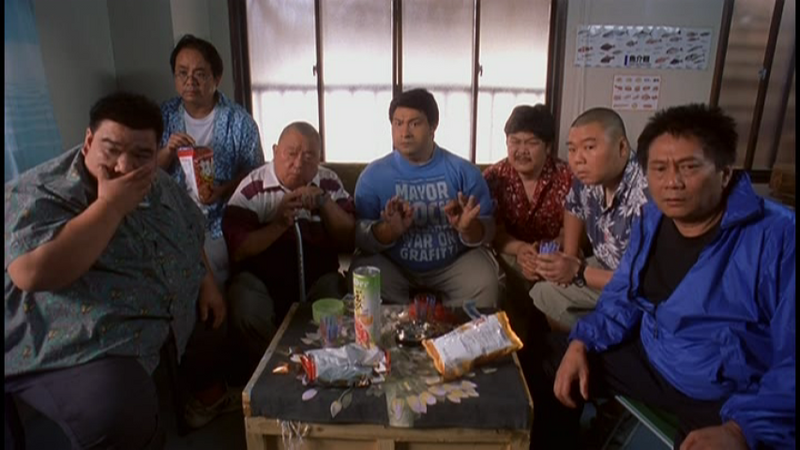 When her pianist came back to Japan, Cheng was too embarrassed to actually return to him, but instead has watched him from afar (as if only an over-devoted fan). At the outset of the film, Cheng depressed and out of money, tries to kill herself -- but her weight causes her attempt to go awry. After this, her Japanese landlady (who looks and sounds she just stepped out of a Tora-san film) introduces her to an equally pudgy Lau (a not terribly traveling cutlery salesman, aslo from Hong Kong).
When her pianist came back to Japan, Cheng was too embarrassed to actually return to him, but instead has watched him from afar (as if only an over-devoted fan). At the outset of the film, Cheng depressed and out of money, tries to kill herself -- but her weight causes her attempt to go awry. After this, her Japanese landlady (who looks and sounds she just stepped out of a Tora-san film) introduces her to an equally pudgy Lau (a not terribly traveling cutlery salesman, aslo from Hong Kong). 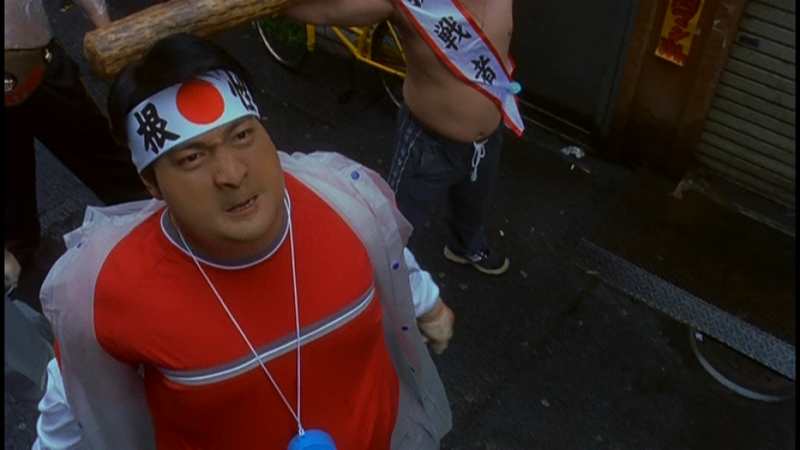 As it turns out, Lau is a ratrher Tora-san-like character (only bigger) -- crude on the outside (with a hopeless romantic lurking deep within). When Cheng learns her pianist is supposed to get married in two months, she begs (and forces) Lau to help her lose weight. Given the magnitude of the task, he enlists his buddies from Tokyo's Chinatown (Lam Suet et al.). Can Cheng slim down -- and can our leads refrain from fallingin love with each other?
As it turns out, Lau is a ratrher Tora-san-like character (only bigger) -- crude on the outside (with a hopeless romantic lurking deep within). When Cheng learns her pianist is supposed to get married in two months, she begs (and forces) Lau to help her lose weight. Given the magnitude of the task, he enlists his buddies from Tokyo's Chinatown (Lam Suet et al.). Can Cheng slim down -- and can our leads refrain from fallingin love with each other?
Sometimes utterly goofy -- and sometimes surprising sweet with glints of seriousness. Not high art, but fine entertainment.
http://i9.photobucket.com/albums/a59/mkerpan/to/diet/diet01.png
http://i9.photobucket.com/albums/a59/mkerpan/to/diet/diet02.png
http://i9.photobucket.com/albums/a59/mkerpan/to/diet/diet04.png
http://i9.photobucket.com/albums/a59/mkerpan/to/diet/diet06.png
http://i9.photobucket.com/albums/a59/mkerpan/to/diet/diet08.png
http://i9.photobucket.com/albums/a59/mkerpan/to/diet/diet11.png
http://i9.photobucket.com/albums/a59/mkerpan/to/diet/diet15.png
http://i9.photobucket.com/albums/a59/mkerpan/to/diet/diet16.png
 An early post-war film looking at the shattering of ordinary people's lives as a result of the war. This focuses narrowly on the relationship between a rich college boy (Eiji Okada) and a working class girl (a darling young Yoshiko Kuga) -- she works for a living, but is also a would-be painter. They first meet when thrown together during an early (pre-firebombing) air raid on Tokyo -- in a bomb shelter.
An early post-war film looking at the shattering of ordinary people's lives as a result of the war. This focuses narrowly on the relationship between a rich college boy (Eiji Okada) and a working class girl (a darling young Yoshiko Kuga) -- she works for a living, but is also a would-be painter. They first meet when thrown together during an early (pre-firebombing) air raid on Tokyo -- in a bomb shelter.  They meet again (at first by accident) -- and grow fond of each other. Neither is brave enough to tell their family of their romance with a member of a different class. He is finally drafted -- and they are supposed to meet one more time, prior to his departure. Because of the sudden illness of his older sister, Okada is late for their rendezvous -- and while she waits in increasing agitation, another air raid occurs...
They meet again (at first by accident) -- and grow fond of each other. Neither is brave enough to tell their family of their romance with a member of a different class. He is finally drafted -- and they are supposed to meet one more time, prior to his departure. Because of the sudden illness of his older sister, Okada is late for their rendezvous -- and while she waits in increasing agitation, another air raid occurs... Beautifully shot (with a kissing-through-a-window shot that is heart melting) with wonderful performances by the leads (and by Haruko Sugimura, playing Kuga's mother). The only negative some very obtrusive (usually not especially necessary) voiceovers. And the Taiwanese DVD I saw had an annoying logo burned into the upper left corner. Too bad a good edition, with English subtitles, is not available.
Beautifully shot (with a kissing-through-a-window shot that is heart melting) with wonderful performances by the leads (and by Haruko Sugimura, playing Kuga's mother). The only negative some very obtrusive (usually not especially necessary) voiceovers. And the Taiwanese DVD I saw had an annoying logo burned into the upper left corner. Too bad a good edition, with English subtitles, is not available.http://i9.photobucket.com/albums/a59/mkerpan/imai/meet/mata02.png
http://i9.photobucket.com/albums/a59/mkerpan/imai/meet/mata04.png
http://i9.photobucket.com/albums/a59/mkerpan/imai/meet/mata05.png
http://i9.photobucket.com/albums/a59/mkerpan/imai/meet/mata06.png
http://i9.photobucket.com/albums/a59/mkerpan/imai/meet/mata09.png
http://i9.photobucket.com/albums/a59/mkerpan/imai/meet/mata10.png
http://i9.photobucket.com/albums/a59/mkerpan/imai/meet/mata13.png
http://i9.photobucket.com/albums/a59/mkerpan/imai/meet/mata16.png
http://i9.photobucket.com/albums/a59/mkerpan/imai/meet/mata17.png
Kome / Rice (Tadashi Imai, 1957)
 This film was set in a coastal village northeast of Tokyo, seemingly with a contemporary setting -- though life here seems still pretty old-fashioned. Most residents do the back-breaking work of rice farming, a few young people have taken up fishing. The film starts with a rather wide focus, but slowly tightens its field to (mostly) one family headed by Yoko Mochizuki (her husband appears disabled in some fashion). T
This film was set in a coastal village northeast of Tokyo, seemingly with a contemporary setting -- though life here seems still pretty old-fashioned. Most residents do the back-breaking work of rice farming, a few young people have taken up fishing. The film starts with a rather wide focus, but slowly tightens its field to (mostly) one family headed by Yoko Mochizuki (her husband appears disabled in some fashion). T o help make ends meet, Mochizuki and her daughter go out out at night to fish for eels (apparently illlegally). Things don't go especially well for the family. Imai is often faulted for his overt leftism. This film (written by the same man who wrote the script for Uchida's 1930s silent on rice farming, "Earth") didn't strike me as particularly ideological -- unless it is "ideological" to present working class people in a sympathetic (yet realistic) fashion and to portray the hardships they face in life.
o help make ends meet, Mochizuki and her daughter go out out at night to fish for eels (apparently illlegally). Things don't go especially well for the family. Imai is often faulted for his overt leftism. This film (written by the same man who wrote the script for Uchida's 1930s silent on rice farming, "Earth") didn't strike me as particularly ideological -- unless it is "ideological" to present working class people in a sympathetic (yet realistic) fashion and to portray the hardships they face in life.
Even with a so-so (off the TV) source, this is a pretty gorgeous looking color film. Because of the large cast, it is hard to focus on the performances of many of the individuals involved -- but Mochizuki does offer an affecting performance.
http://i9.photobucket.com/albums/a59/mkerpan/imai/kome/rice02.png
http://i9.photobucket.com/albums/a59/mkerpan/imai/kome/rice03.png
http://i9.photobucket.com/albums/a59/mkerpan/imai/kome/rice04.png
http://i9.photobucket.com/albums/a59/mkerpan/imai/kome/rice06.png
http://i9.photobucket.com/albums/a59/mkerpan/imai/kome/rice07.png
http://i9.photobucket.com/albums/a59/mkerpan/imai/kome/rice11.png
http://i9.photobucket.com/albums/a59/mkerpan/imai/kome/rice12.png
http://i9.photobucket.com/albums/a59/mkerpan/imai/kome/rice15.png
http://i9.photobucket.com/albums/a59/mkerpan/imai/kome/rice16.png
http://i9.photobucket.com/albums/a59/mkerpan/imai/kome/rice18.png
http://i9.photobucket.com/albums/a59/mkerpan/imai/kome/rice19.png
http://i9.photobucket.com/albums/a59/mkerpan/imai/kome/rice20.png
http://i9.photobucket.com/albums/a59/mkerpan/imai/kome/rice21.png
Manin densha / The Crowded Street Car / The Full-Up Train (Kon Ichikawa, 1957)
 This starts in a straightforward enough manner -- a young man (Hiroshi Kawaguchi -- later in "Giants and Toys" and "Floating Weeds") graduates from college (during an outside ceremony, held during a rainstorm) and goes off to his first real job -- at the Camel Brewery. Unfortunately, his girlfriend (Michiko Ono) has taken a teaching job in another town -- but both go off filled with optimism. After a dull training program, our young hero starts work in the order processing department with great energy, only to be warned by a senior colleague that it is not wise to finish off a day's work during the first hour so of the morning.
This starts in a straightforward enough manner -- a young man (Hiroshi Kawaguchi -- later in "Giants and Toys" and "Floating Weeds") graduates from college (during an outside ceremony, held during a rainstorm) and goes off to his first real job -- at the Camel Brewery. Unfortunately, his girlfriend (Michiko Ono) has taken a teaching job in another town -- but both go off filled with optimism. After a dull training program, our young hero starts work in the order processing department with great energy, only to be warned by a senior colleague that it is not wise to finish off a day's work during the first hour so of the morning.  Then, gradually, things start going wrong. His girlfriend loses her job -- and wants to get married. But our hero, lives in a tiny corporate dorm room, where women are not allowed -- so she departs disconsolately. Then our hero learns that his father (Chishu Ryu -- who runs a clock shop here) and mother (Haruko Sugimura) are each trying to get the other committed to a mental institution -- on allegations of insanity. And then the plots spins into surrealism (or absurdism or utter wildness)...
Then, gradually, things start going wrong. His girlfriend loses her job -- and wants to get married. But our hero, lives in a tiny corporate dorm room, where women are not allowed -- so she departs disconsolately. Then our hero learns that his father (Chishu Ryu -- who runs a clock shop here) and mother (Haruko Sugimura) are each trying to get the other committed to a mental institution -- on allegations of insanity. And then the plots spins into surrealism (or absurdism or utter wildness)...
Because this is a Kon Ichikawa film, one might assume this is impressive looking -- and it is. It's hard to judge the writing on a single viewing (given the lack of subtitles -- and the of any detailed synopsis). Overall quite fascinating -- I wonder if subtitles would make it easier to follow -- or just case additional mystification.
http://i9.photobucket.com/albums/a59/mkerpan/ichikawa_kon/train/manin01.png
http://i9.photobucket.com/albums/a59/mkerpan/ichikawa_kon/train/manin03.png
http://i9.photobucket.com/albums/a59/mkerpan/ichikawa_kon/train/manin04.png
http://i9.photobucket.com/albums/a59/mkerpan/ichikawa_kon/train/manin05.png
http://i9.photobucket.com/albums/a59/mkerpan/ichikawa_kon/train/manin06.png
http://i9.photobucket.com/albums/a59/mkerpan/ichikawa_kon/train/manin08.png
http://i9.photobucket.com/albums/a59/mkerpan/ichikawa_kon/train/manin09.png
http://i9.photobucket.com/albums/a59/mkerpan/ichikawa_kon/train/manin10.png
http://i9.photobucket.com/albums/a59/mkerpan/ichikawa_kon/train/manin11.png
http://i9.photobucket.com/albums/a59/mkerpan/ichikawa_kon/train/manin12.png
http://i9.photobucket.com/albums/a59/mkerpan/ichikawa_kon/train/manin13.png
http://i9.photobucket.com/albums/a59/mkerpan/ichikawa_kon/train/manin14.png
http://i9.photobucket.com/albums/a59/mkerpan/ichikawa_kon/train/manin15.png
http://i9.photobucket.com/albums/a59/mkerpan/ichikawa_kon/train/manin17.png
http://i9.photobucket.com/albums/a59/mkerpan/ichikawa_kon/train/manin18.png
http://i9.photobucket.com/albums/a59/mkerpan/ichikawa_kon/train/manin19.png
http://i9.photobucket.com/albums/a59/mkerpan/ichikawa_kon/train/manin20.png
http://i9.photobucket.com/albums/a59/mkerpan/ichikawa_kon/train/manin21.png
http://i9.photobucket.com/albums/a59/mkerpan/ichikawa_kon/train/manin22.png
Dung fong saam hap / Heroic Trio (Johnnie To, 1993)
 More like a comic book than serious literature, To's film offers an unsettling blend of tragedy and comedy (sometimes mere seconds apart). At its core, pretty grim and violent -- the plot involves a madman looking for a new emperor, who is having infant boys stolen from hospitals. Michelle Yeoh is apparently carrying out the thefts because she is a disciple of the mad master (
More like a comic book than serious literature, To's film offers an unsettling blend of tragedy and comedy (sometimes mere seconds apart). At its core, pretty grim and violent -- the plot involves a madman looking for a new emperor, who is having infant boys stolen from hospitals. Michelle Yeoh is apparently carrying out the thefts because she is a disciple of the mad master ( and her scientist husband has been working on an invisibility device). Anita Mui is the wife of a police official -- and a masked crusader for justice for the helpless in her spare time (unknown to her husband). Maggie Cheung is a motorcycle-riding mercenary -- who will work (she says) for whoever pays best (whther police or criminals). Anthony Wong is a not-too-bright, but seemingly unbeatable killing machine under the command of the master.
and her scientist husband has been working on an invisibility device). Anita Mui is the wife of a police official -- and a masked crusader for justice for the helpless in her spare time (unknown to her husband). Maggie Cheung is a motorcycle-riding mercenary -- who will work (she says) for whoever pays best (whther police or criminals). Anthony Wong is a not-too-bright, but seemingly unbeatable killing machine under the command of the master.
Recounting the plot is pretty pointless -- because it often makes only minimal sense. But our heroines are hot -- and so is the action -- and that's probably about all the point there is (or needs to be) to this.
http://i9.photobucket.com/albums/a59/mkerpan/to/trio/heroic01.png
http://i9.photobucket.com/albums/a59/mkerpan/to/trio/heroic02.png
http://i9.photobucket.com/albums/a59/mkerpan/to/trio/heroic03.png
http://i9.photobucket.com/albums/a59/mkerpan/to/trio/heroic07.png
http://i9.photobucket.com/albums/a59/mkerpan/to/trio/heroic08.png
http://i9.photobucket.com/albums/a59/mkerpan/to/trio/heroic09.png
http://i9.photobucket.com/albums/a59/mkerpan/to/trio/heroic10.png
http://i9.photobucket.com/albums/a59/mkerpan/to/trio/heroic13.png
http://i9.photobucket.com/albums/a59/mkerpan/to/trio/heroic17.png
http://i9.photobucket.com/albums/a59/mkerpan/to/trio/heroic18.png
Sau san naam neui / Love on a Diet (Johnnie To and WAI Ka-fai, 2001)
 Your only chance to see the hunky Andy Lau and willowy Sammi Cheng in fat suits, looking like they weigh somewhere in the 300 pound range -- and speaking lots of fractured Japanese. Despite all, they actually manage to act quite nicely (and funnily).
Your only chance to see the hunky Andy Lau and willowy Sammi Cheng in fat suits, looking like they weigh somewhere in the 300 pound range -- and speaking lots of fractured Japanese. Despite all, they actually manage to act quite nicely (and funnily). Cheng came to Japan (from Hong Kong) 10 years prior to the opening of the film to study singing and fell in love wwith a Japanese pianist. He loved her, but won a scholarship that took him to the UNited States -- and Cheng couldn't follow him. Pining in his absence, she ate and ate to console herself -- and ballooned in size.
Cheng came to Japan (from Hong Kong) 10 years prior to the opening of the film to study singing and fell in love wwith a Japanese pianist. He loved her, but won a scholarship that took him to the UNited States -- and Cheng couldn't follow him. Pining in his absence, she ate and ate to console herself -- and ballooned in size.  When her pianist came back to Japan, Cheng was too embarrassed to actually return to him, but instead has watched him from afar (as if only an over-devoted fan). At the outset of the film, Cheng depressed and out of money, tries to kill herself -- but her weight causes her attempt to go awry. After this, her Japanese landlady (who looks and sounds she just stepped out of a Tora-san film) introduces her to an equally pudgy Lau (a not terribly traveling cutlery salesman, aslo from Hong Kong).
When her pianist came back to Japan, Cheng was too embarrassed to actually return to him, but instead has watched him from afar (as if only an over-devoted fan). At the outset of the film, Cheng depressed and out of money, tries to kill herself -- but her weight causes her attempt to go awry. After this, her Japanese landlady (who looks and sounds she just stepped out of a Tora-san film) introduces her to an equally pudgy Lau (a not terribly traveling cutlery salesman, aslo from Hong Kong).  As it turns out, Lau is a ratrher Tora-san-like character (only bigger) -- crude on the outside (with a hopeless romantic lurking deep within). When Cheng learns her pianist is supposed to get married in two months, she begs (and forces) Lau to help her lose weight. Given the magnitude of the task, he enlists his buddies from Tokyo's Chinatown (Lam Suet et al.). Can Cheng slim down -- and can our leads refrain from fallingin love with each other?
As it turns out, Lau is a ratrher Tora-san-like character (only bigger) -- crude on the outside (with a hopeless romantic lurking deep within). When Cheng learns her pianist is supposed to get married in two months, she begs (and forces) Lau to help her lose weight. Given the magnitude of the task, he enlists his buddies from Tokyo's Chinatown (Lam Suet et al.). Can Cheng slim down -- and can our leads refrain from fallingin love with each other?Sometimes utterly goofy -- and sometimes surprising sweet with glints of seriousness. Not high art, but fine entertainment.
http://i9.photobucket.com/albums/a59/mkerpan/to/diet/diet01.png
http://i9.photobucket.com/albums/a59/mkerpan/to/diet/diet02.png
http://i9.photobucket.com/albums/a59/mkerpan/to/diet/diet04.png
http://i9.photobucket.com/albums/a59/mkerpan/to/diet/diet06.png
http://i9.photobucket.com/albums/a59/mkerpan/to/diet/diet08.png
http://i9.photobucket.com/albums/a59/mkerpan/to/diet/diet11.png
http://i9.photobucket.com/albums/a59/mkerpan/to/diet/diet15.png
http://i9.photobucket.com/albums/a59/mkerpan/to/diet/diet16.png
Comments